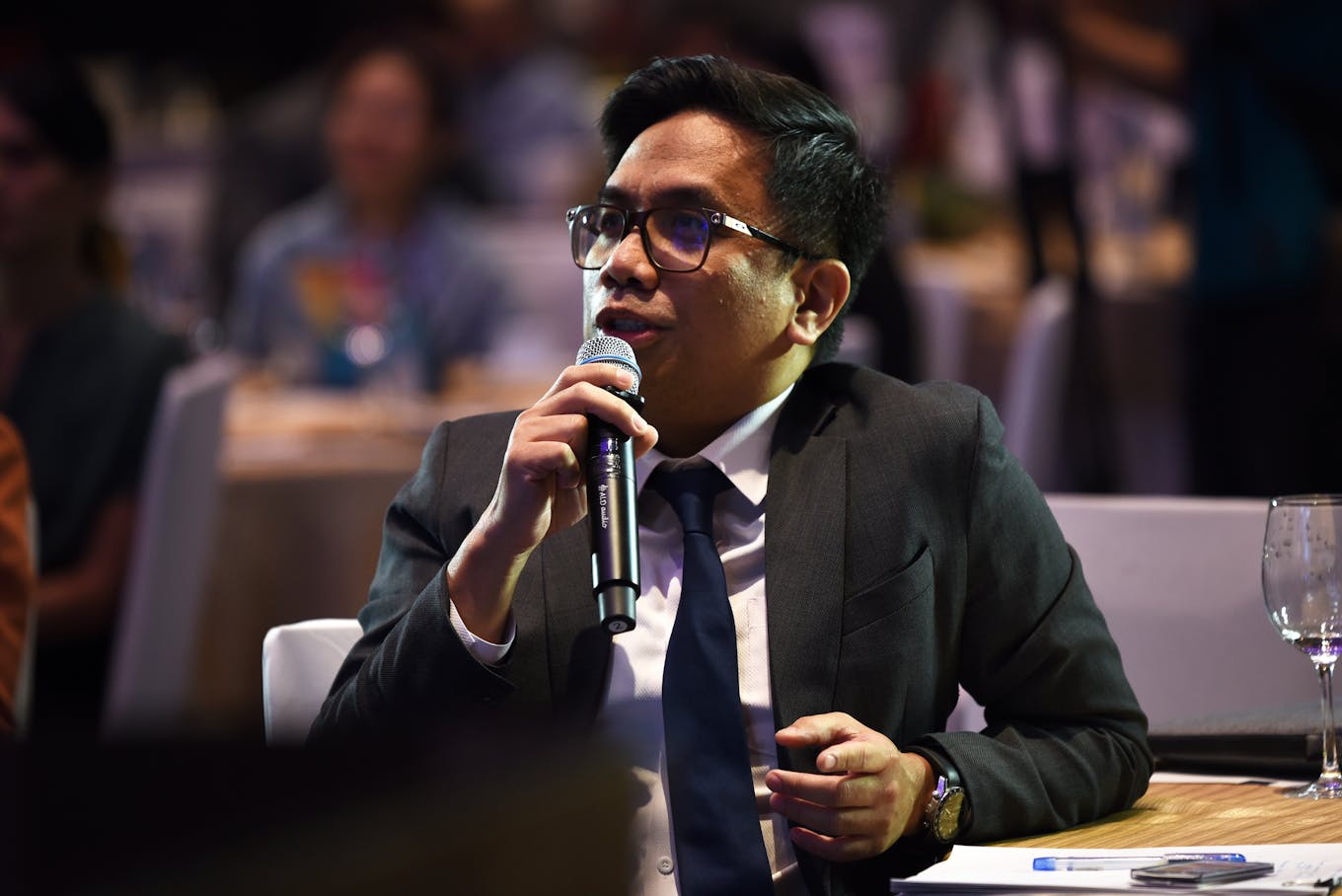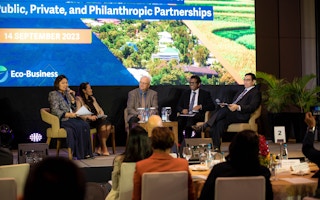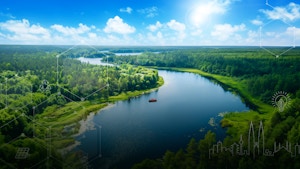Philippines’ first-ever sovereign wealth fund – the Maharlika Investment Fund – has adequate safeguards against corruption and was set up with “good intentions” to drive strategic investments, including in sustainable finance and low-carbon energy, said a Department of Finance representative, in the government’s latest pitch to its external partners.
To continue reading, subscribe to Eco‑Business.
There's something for everyone. We offer a range of subscription plans.
- Access our stories and receive our Insights Weekly newsletter with the free EB Member plan.
- Unlock unlimited access to our content and archive with EB Circle.
- Publish your content with EB Premium.
Political and government leaders have been actively pushing the controversial fund – a ‘make or break’ attempt by Philippine President Ferdinand Marcos Jr to cement his legacy after more than a year in office – to investors, even as it faces a constitutional challenge in the Supreme Court.
Speaking at the Unlocking capital for sustainability (UCFS) Philippines event held in Manila last Thursday, Eufrocinio Bernabe Jr, assistant secretary at the Department of Finance, tried to assuage concerns about graft and corruption in the country, and highlighted how the new fund has at least eight safeguards in place to prevent corruption or even to correct negative “perceptions of corruption”.
Bernabe Jr was responding to an audience poll where the room of almost 100 participants were asked to describe the greatest challenge that the Philippines face in driving sustainable finance. ‘Corruption’ was the top answer.

Assistant secretary Eufrocinio Bernabe Jr of the Office of the Chief Economist, Department of Finance gave the opening keynote at Unlocking capital for sustainable Philippines as he highlighted the Maharlika Investment Fund and key updates on sustainable finance in the Philippines. Image: Eco-Business
“If the (mention of) corruption stems from the creation of the Maharlika Investment Fund, I believe the context is derived from a recent scandal involving another country which runs a sovereign wealth fund which has (gotten into trouble with) the law,” he said, alluding to Malaysia’s 1Malaysia Development Berhad (1MDB) saga, which concluded with the country’s former Prime Minister Najib Razak serving a 12-year jail sentence for graft and corruption.
An estimated US$4.5 billion was allegedly misappropriated from 1MDB by high-level officials of the finance facility and their conspirators in the span of five years.
“We would like to appease the public that our fund has good intentions, as well as safeguards against corruption,” assured Bernabe Jr.
In his keynote speech, Bernabe Jr noted that the fund will serve as an additional source of financing for priority projects in the Philippines, among them projects for green energy, water resources and physical infrastructure. A sovereign wealth fund is a state-owned investment fund comprised of money generated by the government, often derived from a country’s surplus reserves.
Cautionary tale
The Marhalika Investment Fund has been divisive, even among the Philippines’ Senate and Congress members, with a key criticism being that it is essentially not a “sovereign wealth fund”, as it can invest not just in financial instruments such as stocks and bonds, but also in economic projects. A bill proposed in the House of Representatives to support its enactment was also passed in less than eight months.
During a state visit earlier this year, current Malaysian Prime Minister Anwar Ibrahim, in a media interview, held up the 1MDB scandal as a cautionary tale for the Philippines as the Marcos administration eyes the establishment of its own multibillion-peso wealth fund.
“
We would like to appease the public that our fund has good intentions, as well as safeguards against corruption.
Eufrocinio Bernabe Jr, assistant secretary, Department of Finance, Philippines
At the green finance conference to discuss how the public, private and philanthropic sectors can collaborate to push the sustainability agenda, Bernabe Jr said there are ample accountability provisions in the Maharlika Investment Fund Act.
Among the safeguards are the establishment of a Joint Congressional Oversight Committee (JCOC) tasked with overseeing and monitoring the implementation of the fund, scrutiny by the Commission on Audit and the employment of an internationally recognised firm as an external auditor. The fund is also aligned with the Santiago Principles, a set of 24 best practices for sovereign wealth funds drafted by the International Forum of Sovereign Wealth Funds and endorsed by the International Monetary Fund.
Nominations for the board of directors of the Maharlika Investment Corporation (MIC) opened earlier this month, with it set to close on 27 September. With an authorised capital stock of P500 billion (US$8.9 billion), the MIC will act as the sole entity to mobilise and utilise the MIF for investments.
“We are on track, and the corporation will be up and running by the end of this year,” said Bernabe.
During the 10th Asia Summit hosted by the Milken Institute in Singapore earlier this month, Marcos explained that the Maharlika Investment Fund is a way of “putting to work” the country’s reserve for investment without relying on increased borrowings while highlighting energy development, infrastructure and agriculture as key investment areas in the Philippines.
“Finance will play an indispensable role in implementing and expediting climate action. It dictates the pace and scale of a transition towards the attainment of our climate ambition,” noted Bernabe, adding that the MIF will “open the corridor” for the Philippines to access the world’s pool of sovereign wealth funds and that the government is keen on adopting a green and blue economy roadmap moving forward.
Need for strong institutions
Since 2010, the Philippines has lagged regional peers in Asean in attracting foreign investment, with key stakeholders noting that the archipelagic nation is dogged by natural disaster risks and a lack of strong institutions.
With up to 20 typhoons barrelling into the country every year, the Philippines incurs some P200 billion (US$3.5 billion) in economic losses annually from extreme weather events and other natural disasters.
“When it comes to climate finance, risk is one of the biggest inhibitors of private investment. [Increased] risk can [mean] a loss of profits,” said Kithmina Hewage, senior advisor at the Centre for Asian Philanthropy and Society (CAPS), speaking at the same event.
“When we talk about corruption, transparency and accountability, we need to dig down to where [the concerns] come from,” he said, while referring to the lack of trust in institutions among Filipinos. “Independent and strong institutions are what can address these issues.”
Marcel Silvius, Philippines country representative and deputy director, Asia at Sustainable Landscapes CoP and Asia Pacific lead at the Global Green Growth Institute, noted gaps in the Philippines’ policy framework for sustainable finance, as well as a lack of green capacity building for manpower in the country’s financial institutions.
“I think that the Philippines is still running behind many other countries,” said Silvius. “The investments in climate adaptation in the Philippines need to be business-based. There’s no appetite at all, no capacity from the country’s banks. They need to be profitable and that will create sustainability [in the long run].”
He suggested for the Philippine government to set green targets for commercial banks, such as pushing them to green a portion of their portfolio by 2050.
Rhodora Brazil-De Vera, deputy director of the supervisory policy and research department within the financial supervision sector at the Bangko Sentral ng Pilipinas, said that the central bank is currently collaborating with the Securities and Exchange Commission and the Insurance Commission to craft sustainable finance taxonomy guidelines for the Philippines.
These guidelines, supported by the World Bank, are slated for launch later this year, with the initial phase focusing on climate mitigation and adaption, as well as circular economy.
An executive of the largest bank in the Philippines stressed that there is untapped potential and growing interest when it comes to sustainable finance in the country.
Atty Federico Tancongco, senior vice president and chief compliance officer at BDO Unibank, highlighted that, in 2022, the bank successfully raised P52.7 billion (US$927 million) in peso-denominated fixed-rate Asean sustainability bonds, more than 10 times the original offer of P5 billion (US$88 million), due to robust demand from retail and institutional investors.
“[Within] the context of the Philippines, this is huge. There are so many [who] want to go into [sustainable finance]. We have to connect funds to viable projects because the money is there,” Tancongco explained. “There’s actually more money than there are projects, but those projects have to be robust.”
“
In the realm of climate change, extending the life of a tree [holds] more value than [its] timber. We need to invest in sustainable landscapes.
Marcel Silvius, Philippines country representative and deputy director Asia, Global Green Growth Institute
To weather future storms, the Philippines needs to bank on the collaboration of its private and public sectors to mobilise much-needed funding for climate action, noted several UCFS Philippines speakers.
“We need an open ecosystem of actors from both the private sector and the public sector. The money is there. The challenges are around red tape, regulatory reforms, transparency, corruption, you name it. There is that need [to send] strong signals [of change] from the government,” said Laure Nicole Stephanie Beaufils, UK ambassador to the Republic of the Philippines and the Republic of Palau.
“In the realm of climate change, extending the life of a tree [holds] more value than [its] timber. We need to invest in sustainable landscapes. It’s not throwing money at climate change; it’s an investment that will have a payback. It will enhance your economy. Going forward, a green economy is the way to go,” concluded Global Green Growth Institute’s Silvius.














